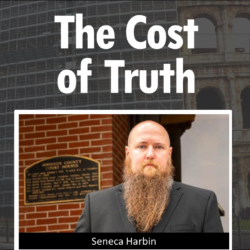 Today we are beginning a new series called “Misunderstood Texts about Jesus” with Bill Schlegel. Professor Schlegel lived and taught the bible and geography in Israel for more than three decades. Recently, he came to change his mind on the deity of Jesus, seeing him now as God’s man rather than a God-man. Since he made this change, several friends and acquaintances have brought up a number of scriptures that they believe prove Jesus is God. This podcast series is Schlegel’s opportunity to answer these commonly misunderstood verses and explain what they mean. In this episode we discuss the following texts:
Today we are beginning a new series called “Misunderstood Texts about Jesus” with Bill Schlegel. Professor Schlegel lived and taught the bible and geography in Israel for more than three decades. Recently, he came to change his mind on the deity of Jesus, seeing him now as God’s man rather than a God-man. Since he made this change, several friends and acquaintances have brought up a number of scriptures that they believe prove Jesus is God. This podcast series is Schlegel’s opportunity to answer these commonly misunderstood verses and explain what they mean. In this episode we discuss the following texts:
- John 1.1
- John 1.14
- John 1.18
- John 5.18
- John 8.58
Next time we’ll discuss five more scriptures from John.
—— Links ——
- To learn about Schlegel’s backstory, listen to Interview 31: Master’s University Prof. Finds Son of God, Loses Job
- Check out his excellent book, the Satellite Bible Atlas here
- Follow Bill Schlegel on his blog or on YouTube
- For an extensive list of verses and explanations from a biblical unitarian perspective, visit christianmonotheism.com (use the scripture index on the right)
- Watch “Five Major Problems with the Trinity” on YouTube
- Intro music: Jazzy Frenchy by bensound.com. Licensed under Creative Commons: By Attribution 3.0 License.






Sean, thanks for allowing Bill the opportunity to respond to the plethora of criticisms he’s received. May this episode, along with the subsequent ones, bring fruitful and God-glorifying dialogue. Be well.
Rev. 3:14, Jesus said he was the “beginning of creation.” (Stay with me; don’t get ahead. I don’t disagree with anything Bill said.)
Col. 1:15, Paul said Jesus was the “firstborn of creation.”
Mic. 5:2 says the one who “is to be ruler in Israel” had his “origin” (RSV) “from of old, from ancient days.” There were no “days” before “in the beginning.
Jesus was “the beginning of creation” as the “word of God.” Where was this “word”?
Gen. 1:3, “God SAID….” When God SPOKE, the WORD was created, but not “begotten.” “Begotten” requires a mother, but there was no one to be a mother before “In the beginning.”
About John 1:1, John was a Hebrew, thinking in Hebrew, but writing in Greek. (I think this has been decided, not that it was originally in Hebrew.) He said “the word was God,” but what was his Hebrew mind thinking? The nearest Greek word that he could come up with for the Hebrew “El” was “Theos.” But “El” means “strength, might.” Elohim is plural for El and means “strengths.” So I consider that John 1:1 should say “the Word was with Elohim, and the Word was (ALSO) strength/strong.”
We also could have pointed out that when the Samaritan woman said to Jesus: “I know that Messiah is coming (he who is called Christ). When he comes, he will tell us all things.” 26 Jesus said to her, “I who speak to you am he.”
In the NT Greek, Jesus spoke the exact same words to her as he did in John 8:58, ego eimi “I am”. Clearly Jesus means “I am he (the Messiah).”
Here is my best effort at converting John 1:1-14 into today’s English, while trying to balance the original textual words with what they would mean to today’s audience:
1. The message existed in the beginning and the message pertained to the [one/singular] God, and the message was divine.
2. This [message] originated with the [one/singular] God.
3. All was generated through it, and without it nothing generated has existed, not one [thing].
4. Within this [message] was life, and was the illumination of human life.
5. And the illumination is shining in the darkness, and the darkness cast [it] down.
6. A man became commissioned by God. His name [was] John.
7. This one came for a testimony, that he should be testifying concerning the illumination, [so] that all would be believing through him.
8. He was not the illumination, but his intent was to be testifying concerning the illumination.
9. [This] was the truthful illumination which is [now] going into the world, enlightening every man.
10. It was [already] in the world, and through it the world was generated, [yet] the world [did] not allow it [, the message of light, to be known].
11. Among its acquaintances it came, and its acquaintances did not receive it.
12. But whoever takes hold of it, to them it gives authority to be becoming children of God, [that is,] the ones believing in its authority.
13. [These children of God are those] who were generated, not by blood[line], neither fleshly determination, neither by decree of man, but were regenerated by God.
14. And the message materialized in flesh and dwelt among us, and we observed his honor, honor according to one generated next to [, in the likeness of,] his Father, full of grace and truth.
Brothers. That was excellent. It makes so much sense. Bless you both.
Thank you very much for your research and explanation. As a former Trinitarian, I really find it quite odd that the idea of the Trinity as is used today ever got off the ground. This is just me, but it seems that the idea of God the father being God and having a Son to be the one to save the creation does not make the Son the Father. A bad example might be in God’s creation of Adam and Eve who were said to be in the image and likeness of God. I can’t fathom how one could then surmise that because they were in the image and likeness of God they were God. Thanks for your work.